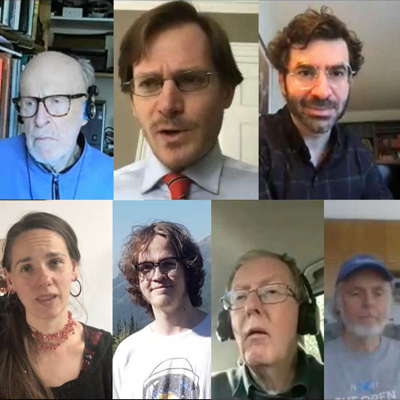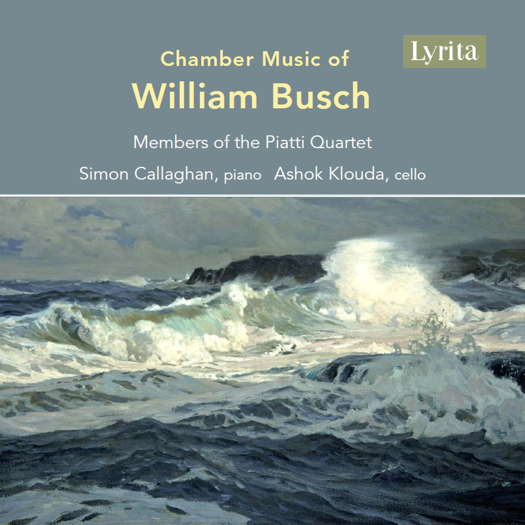- New York Metropolitan Opera
- Lincoln Center
- Slovakian
- San Diego Opera
- Graupner
- Sebastian Field
- Judith Webster
- James Farmer
ARTICLES BEING VIEWED NOW:
- Régine Crespin
- Hector Berlioz
- Ruth Railton
- Marián Varga
- Marina Koshetz
 VIDEO PODCAST: John Dante Prevedini leads a discussion about Classical Music and Artificial Intelligence, including contributions from George Coulouris, Michael Stephen Brown, April Fredrick, Adrian Rumson and David Rain.
VIDEO PODCAST: John Dante Prevedini leads a discussion about Classical Music and Artificial Intelligence, including contributions from George Coulouris, Michael Stephen Brown, April Fredrick, Adrian Rumson and David Rain.

A Fine Composer
GEOFF PEARCE highly recommends chamber music by British composer William Busch
'... admirably performed ...'
I had only heard of William Busch (1901-1945) in passing and erroneously believed he was of the same family as the violinist Adolf Busch. My interest was piqued with this release, and I am glad that it was. Busch started out as a concert pianist and had some notable teachers, but towards the end of the 1930s he began to put a lot more of his efforts into composition. His output, whilst small, illustrates what a fine composer he was, and it was a real loss to the music-making world that he died tragically young, just as he was about to hit his stride. Recordings of his music are few and far between. The piano concerto and cello concerto are also fabulous works that have been recorded. The pieces recorded on this disc are all chamber works written in the last five years of the composer's life.
The first three tracks are given over to his 'Three Pieces for Violin and Piano' from 1943-44. These works were written as sperate pieces and as such can be played singly or together.
The opening Cantilena starts serenely and I find that his use of rests is one of the things that make me enjoy this music so much, as the piece breathes. The middle section is more agitated and dramatic before the calmness is restored in the last few bars.
Listen — William Busch: Cantilena (Three Pieces for Violin and Piano)
(SRCD 439 track 1, 2:00-2:46) ℗ 2025 Lyrita Recorded Edition :
The second piece, a short and lively 'Caprice', displays the agility of the violin the most of all the three pieces.
Listen — William Busch: Caprice (Three Pieces for Violin and Piano)
(SRCD 439 track 2, 0:02-0:42) ℗ 2025 Lyrita Recorded Edition :
The third piece, a Lacrimosa, is the longest. It opens with what the attached notes describe as 'an elegant, melancholic theme' and this is the feeling that the work displays throughout its length. Michael Trainor and Simon Callaghan give these pieces a compelling performance, in what I can only describe as a ravishingly beautiful sound.
Listen — William Busch: Lacrimosa (Three Pieces for Violin and Piano)
(SRCD 439 track 3, 3:31-4:10) ℗ 2025 Lyrita Recorded Edition :
The 'Passacaglia for Violin and Viola' (1939) is a spirited and energetic work and takes just over seven minutes. It consists of a four bar theme with thirty variants which range considerably in mood. It is one of the most effective duos that I have heard for these two instruments and I cannot recommend this work highly enough.
This is followed by the three minute A Memory for cello and piano (1944). This is touching, wistful and sometimes a little troubled, but is a fine heartfelt work, and like everything on this disc, beautifully performed, in this case by Jessie Ann Richardson and Simon Callaghan.
The longest work on the disc, the Quartet for Piano and Strings (1939), is a substantial work of thirty-one minutes but one never feels that there is any unnecessary material. In the first movement, the two main thematic ideas are beautifully and skilfully contrasted, and the music sounds in no way contrived. It has proven to be one of the composer's most often performed works, and he has left a brief note of explanation for this work.
Listen — William Busch: Allegro con brio (Quartet for Piano and Strings)
(SRCD 439 track 6, 0:02-0:46) ℗ 2025 Lyrita Recorded Edition :
The second movement, Largo, is a lament in three sections, with the middle section being pastoral in nature and quite tender. It would not be surprising if someone like Gerald Finzi had written it.
The third movement, a Scherzo and Trio, opens abruptly, is quite stormy in nature and quite tense. This is contrasted by a calmer trio. The change in mood and pace is quite dramatic. I love this movement for its contrast and the skill with which the composer employs his forces.
Listen — William Busch: Allegro con brio (Quartet for Piano and Strings)
(SRCD 439 track 8, 1:22-2:21) ℗ 2025 Lyrita Recorded Edition :
The final movement is a theme and twelve variations. The theme is rather measured and muscular, and the variations are of contrasting nature, but the presence of the theme is always felt. This movement balances out the whole work in a very satisfying manner.
The four-movement 'Suite for Cello and Piano' from 1943 was one of the numerous works that the composer wrote for the cellist Florence Hooton, and this could become a major work in a cellist's repertoire. This is performed by Ashok Klouda on cello and Simon Callaghan on piano.
The first movement is, as the notes in the booklet describe, 'sombre and purposeful', and this feeling is maintained throughout the movement.
The second movement, 'Capriccio', is energetic and rhythmically complex, and I find it the perfect contrast to the first movement, even though it is quite dramatic and by no means light-hearted.
The third movement is a complete contrast, with long melodic lines in the cello overlying a gentle rocking piano part. It certainly earns its title of 'Nocturne'.
The final Tarantella, fully worthy of its title, is quite ferocious and required considerable virtuosity from both performers. The dedicatee presented this movement as a stand-alone piece in a recital, and the reviewer found it 'somewhat macabre'.
Listen — William Busch: Tarantella (Suite for Cello and Piano)
(SRCD 439 track 13, 1:46-2:23) ℗ 2025 Lyrita Recorded Edition :
The final work, 'Elegy for Violoncello and Piano' (1944), nearly seven minutes in duration, plays to the cello's lyrical nature with an extended opening for cello alone. Admirably performed by both artists of the previous work, this lovely autumnal-natured work with a somewhat impassioned middle section is a beautiful little piece to end this disc.
I have been most impressed by the music and performances here, and I live in hope that this composer enjoys the recognition that he truly deserves. His music has been one of the great discoveries on my musical journey. Also to be commended are the accompanying notes and the excellent sound recording. I highly recommend this disc.
Copyright © 5 January 2025
Geoff Pearce,
Sydney, Australia



